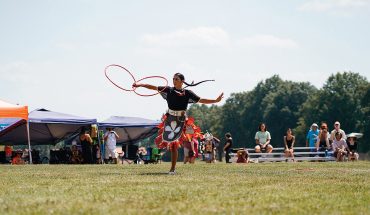by Ann Brooke Raynal
photographs by Nick Pironio
Twenty kindergartners at Walnut Creek Elementary School in Southeast Raleigh strike the “Statue of Liberty” pose, violins held high in one hand, bows at an angle in the other. Aside from a wiggle here and a giggle there, the kids stand frozen, waiting for a cue from Bryson Finney, the school’s music teacher, or from professional violinist Erica Shirtz. When the cue comes, the class jolts into life and sound. There are visitors in the room, and the students are eager to perform.
This is a scene that repeats itself five days a week in the nine Triangle-area schools served by a young nonprofit called Kidznotes. Founded in Durham in 2010, Kidznotes serves 225 children in that city, and this past fall enrolled 60 kindergartners at Walnut Creek, East Garner and Poe elementary schools in Wake County. Students in these Title One schools (schools with a high percentage of poor students) receive instruments, 10 hours a week of music instruction from master teachers, and a safe place to learn a new skill. “The hours between 4 and 6 p.m. are statistically the most dangerous for school-aged children,” says Keith Strombotne, Kidznotes’ director of philanthropy. “Not only are these children safe, they are using their time so beautifully. Parents can work a full day and feel great about what their children are doing.”
Kidznotes is modeled on a program called “el Sistema” developed in Venezuela to help lift underprivileged children out of poverty through music education. Executive Director Katie Wyatt, herself a concert violist, explains: “Music focuses the mind. It’s complex, but anyone can do it. (el Sistema founder) Jose Antonio Abreu wanted to open the doors of access to all kids. The program fosters discipline, creativity, and a love for hard work.” All crucial life lessons designed to help break the cycle of poverty.
Wyatt, who holds a double degree in viola and political science, says she has always been fascinated by “the ways in which culture helps make decisions about who we are.” She left the N.C. Symphony, where she served as outreach coordinator, for a year-long study of el Sistema on site in Venezuela as one of the first recipients of an Abreu fellowship. First, though, Durham philanthropist Lucia Powe extracted a promise from Wyatt to return to the Triangle and implement a similar program here.
Today, Kidznotes partners with public schools, which pay their own music teachers to provide after-school instruction in conjunction with Kidznotes’ master musicians. Kindergarteners start on the violin at their own elementary schools, and after the first year, they meet for lessons at a “nucleo” school each afternoon. As they advance from “Mozart,” or beginners, to “Brahms,” or intermediates, and on to “Beethoven,” students are allowed to change instruments.
The nucleo schools serve as school bus stops for children in Wake and Durham counties and also as the location for their two-and-a-half hour practices each Saturday. Free summer camps in Durham and Raleigh provide continuing education for students, as well as much-needed summer child-care for families.
Ten hours a week represents a huge commitment to the program by each family, but it’s one they seem happy to make. “Students feel in charge of their lives, more confident. The families really get behind and take pride in the program,” Strombotne says. A high retention rate reflects strong parental support. “Kids don’t leave the Kidznotes program unless their families are moving away,” says Strombotne.
Having worked for the music-based Raleigh nonprofit BandTogether, Strombotne is something of an expert on local charities. “I’ve never seen a nonprofit receive so much community support so quickly!” he says.
Kidznotes’ fundraiser gala in April raised almost 10 percent more than its goal of $100,000. Violinist Erica Shirtz knows why: “A program like this gives these kids an opportunity that they never would have otherwise, and there is such a demand for it. Everyone wants to hear them and volunteer to help, because they see how amazing it is that these little kindergartners can play the violin. They work hard, they perform, they get honored for it, and the cycle continues as they progress technically.”
Bryson Finney, who teaches alongside Shirtz, was hesitant to take on the additional after-school commitment, but a trip to Durham to watch the kids in action changed his mind. “My goal as the music educator at Walnut Creek is not simply to teach music to my 700-plus students, but to leave a mark, a legacy, in each of their lives. When an opportunity comes that could make a positive impact, even to change their lives through music, I jump on it!”
He says his work with the kindergartners has been well worth it: “They are understanding various musical concepts, and the Italian words to go along with them. They are reading musical notation on a five-line staff. They’re able to explain how to find the A-major scale on their violins and perform it, and transfer their musical knowledge to other percussive instruments. I have fallen in love with the Kidznotes program!”
The discipline Finney observes in his young musicians is echoed in their school careers. The program says that compared to their peers, children enrolled in the Kidznotes program are more likely to attend school regularly and achieve academically.
Not surprisingly, el Sistema-based programs are springing up all over the country. Along with prospective board members and potential corporate partners visiting Walnut Creek on this day, Asheville teacher/musician Brian Kellum is also here. He wants to build a similar program in under-served Asheville-area schools though a partnership with the Asheville Symphony. One of the visitors asks the children, “What do you like best about Kidznotes?” All hands shoot up. One child claps his fingers over his mouth to prevent himself from shouting out an answer in his excitement.
Wyatt’s goals for the next few years are clear: “A thousand students by 2020. A million-dollar budget by 2017.” If recent history is any indication, she and Kidznotes will get there. But nailing down the future is a lot less important than showing up in the present, she’d tell you. The advice Wyatt gives others is also the best lesson she learned from her time studying el Sistema in Venezuela: “Start right now!”






